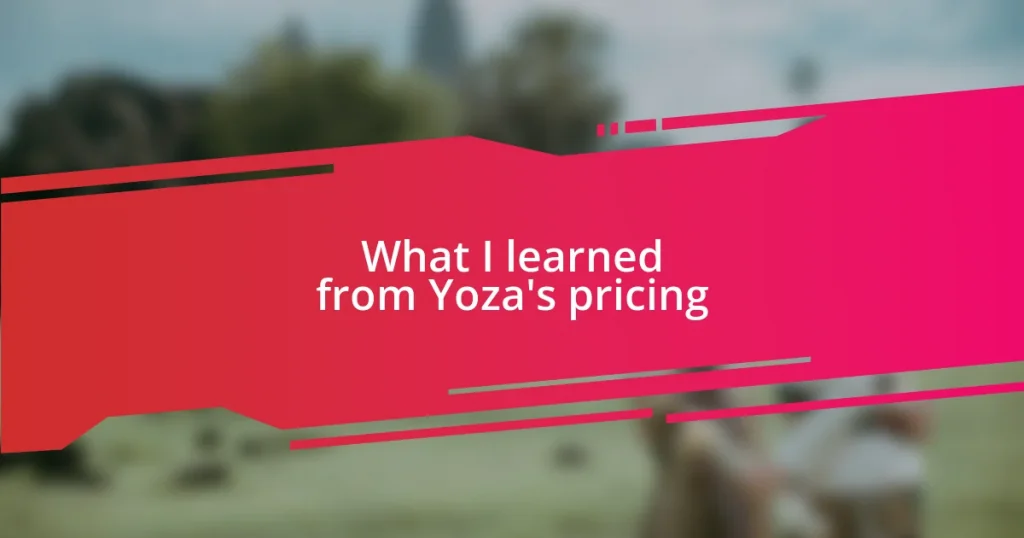Key takeaways:
- Yoza’s flexible pricing strategy offers various tiers, catering to different user needs and promoting customer satisfaction and loyalty.
- The transparent pricing model eliminates hidden fees, fostering trust and confidence among users when making financial decisions.
- Active responsiveness to customer feedback allows Yoza to adapt its pricing and features, creating a sense of community and enhancing user engagement.
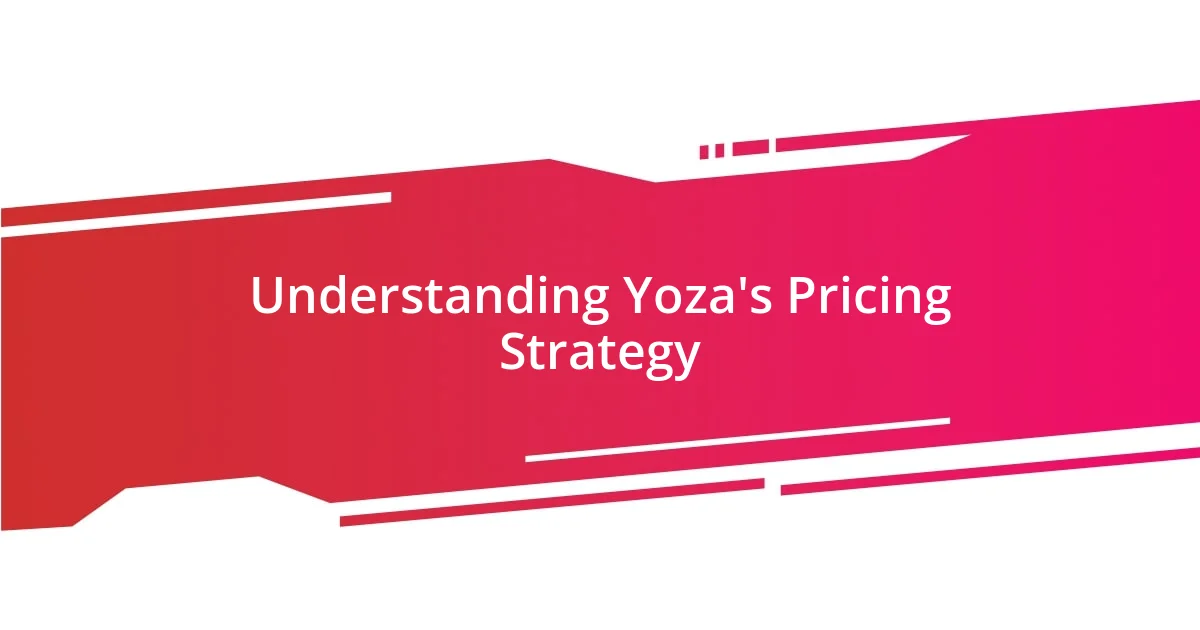
Understanding Yoza’s Pricing Strategy
Yoza’s pricing strategy is fascinating because it reflects a deep understanding of its target market. I remember when I first encountered their pricing tiers—I was pleasantly surprised by how accessible they were for small businesses. It made me wonder, what if more companies adopted this level of inclusivity?
Diving into the structure, I noticed that Yoza offers a range of plans, each tailored to different needs. This accessibility not only attracts budget-conscious consumers but also provides room for growth—something that resonates with my experience as a small business owner striving for scalability. Can a flexible pricing model like this truly foster customer loyalty in the long run? From my perspective, it absolutely can.
Moreover, the psychological aspect of their pricing cannot be overlooked. I felt an immediate sense of value when I saw features bundled with attractive price points. It made me think—how does pricing influence our perception of quality? In my case, Yoza’s approach made their services feel premium yet affordable, which is a delicate balance that many businesses struggle to achieve.
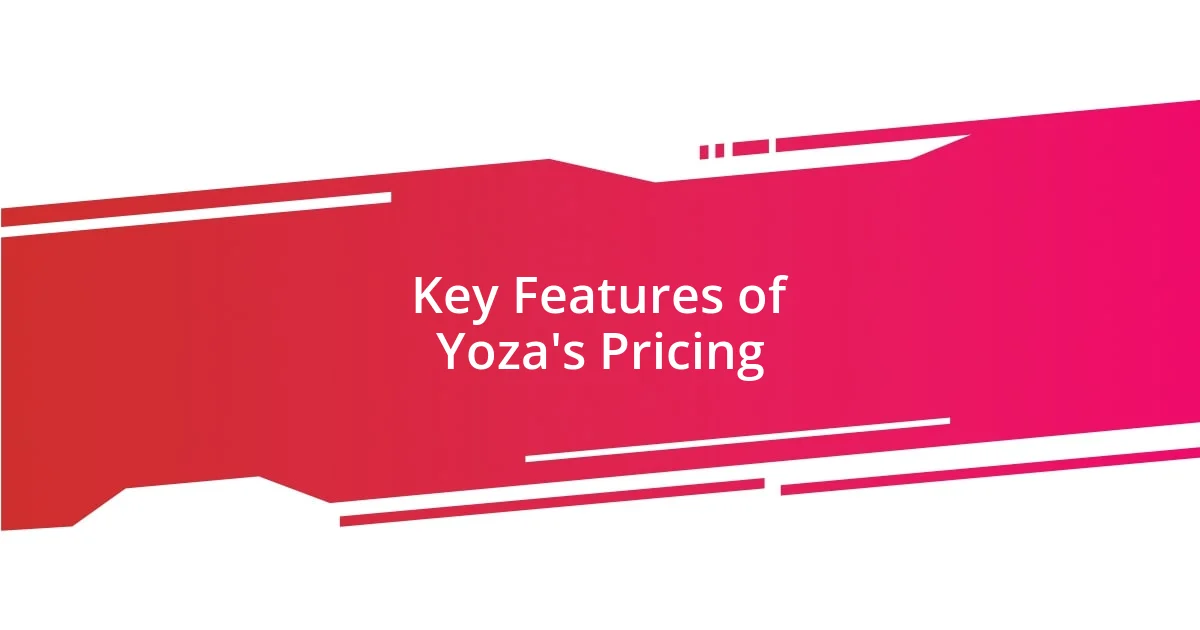
Key Features of Yoza’s Pricing
The first thing that struck me about Yoza’s pricing was the variety of options available. As someone who values flexibility, I found it refreshing to see multiple plan tiers that cater to different user needs. It sparked a memory from my early days in business, where I felt trapped by one-size-fits-all pricing models; with Yoza, I realized that such diversity not only cultivates customer satisfaction but also encourages long-term commitment.
In addition to various tiers, Yoza’s pricing includes essential features that resonate personally with me. For instance, the integration of advanced analytics tools in their mid-tier plan caught my eye. I remember launching a campaign without sufficient data insights and how it impacted my decision-making—having access to such features at a reasonable cost feels like investing in my success. It’s a remarkable incentive for users who may be hesitant to commit to higher costs without clear value.
One aspect that stood out as well is how transparent Yoza is about their pricing. I often appreciate when companies lay all the cards on the table. It reminded me of when I compared services for my own needs, only to find hidden fees lurking behind attractive initial prices. Yoza’s upfront approach builds trust, which is crucial for anyone looking to make a smart investment in their business strategy.
| Feature | Basic Plan | Mid-Tier Plan | Premium Plan |
|---|---|---|---|
| Price | $19/month | $49/month | $99/month |
| Number of Users | 1 User | Up to 5 Users | Unlimited Users |
| Analytics Tools | No | Yes | Yes |
| Customer Support | Email Support | Priority Email Support | 24/7 Support |
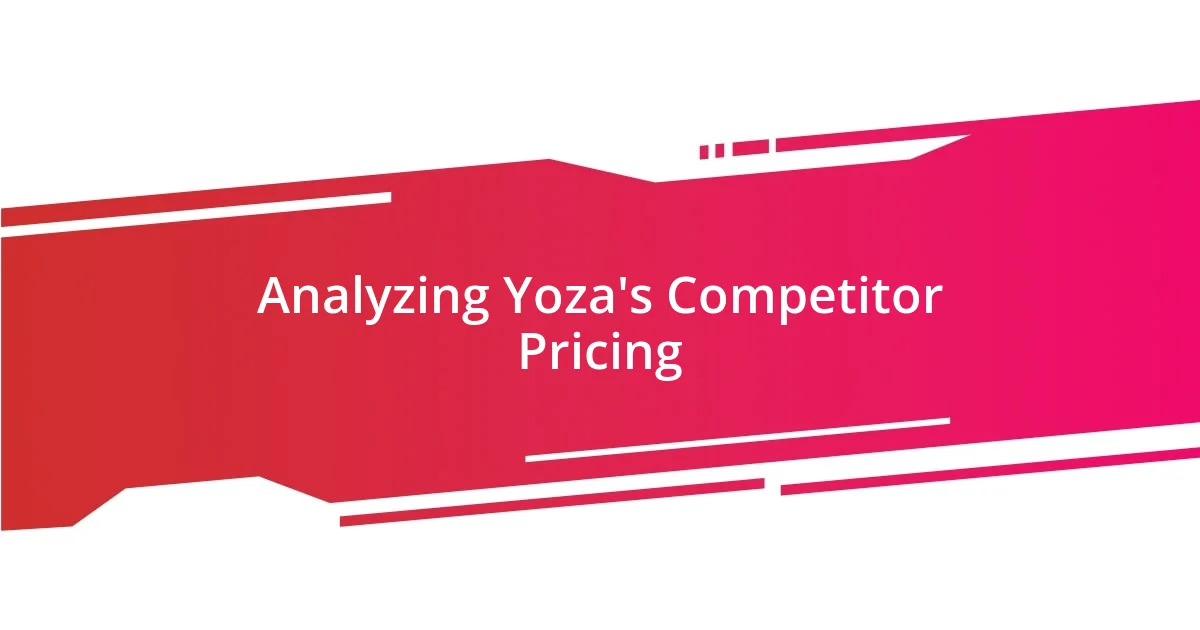
Analyzing Yoza’s Competitor Pricing
Analyzing Yoza’s competitor pricing reveals some striking contrasts that truly highlight Yoza’s strengths. During my research, I realized that many of Yoza’s competitors employ a rigid pricing strategy that can alienate potential customers. Reflecting on my own experiences with such inflexibility, I remember feeling frustrated when trying to find services that fit my needs without breaking the bank. This makes me appreciate how Yoza’s offerings stand out in a crowded marketplace.
Here’s a snapshot of how Yoza compares with a few competitors in the industry:
-
Competitor A:
- Basic Plan starts at $29/month, providing only limited features
- Limited user capacity can lead to additional costs as businesses grow
-
Competitor B:
- Premium features are locked behind a high price tag of $149/month
- Little transparency in additional fees and user limits
-
Competitor C:
- Offers a tiered system but lacks essential tools in lower-priced plans
- Relatively poor customer support, which I’ve found crucial during my own project launches
In analyzing these options, Yoza’s strategic flexibility is not just a pricing choice; it reflects a commitment to fostering real relationships with its users. In the past, I often felt defeated when my chosen service provider did not support my growth. With Yoza, I see a path forward, where the pricing is designed to evolve with me, allowing space for both learning and expansion.
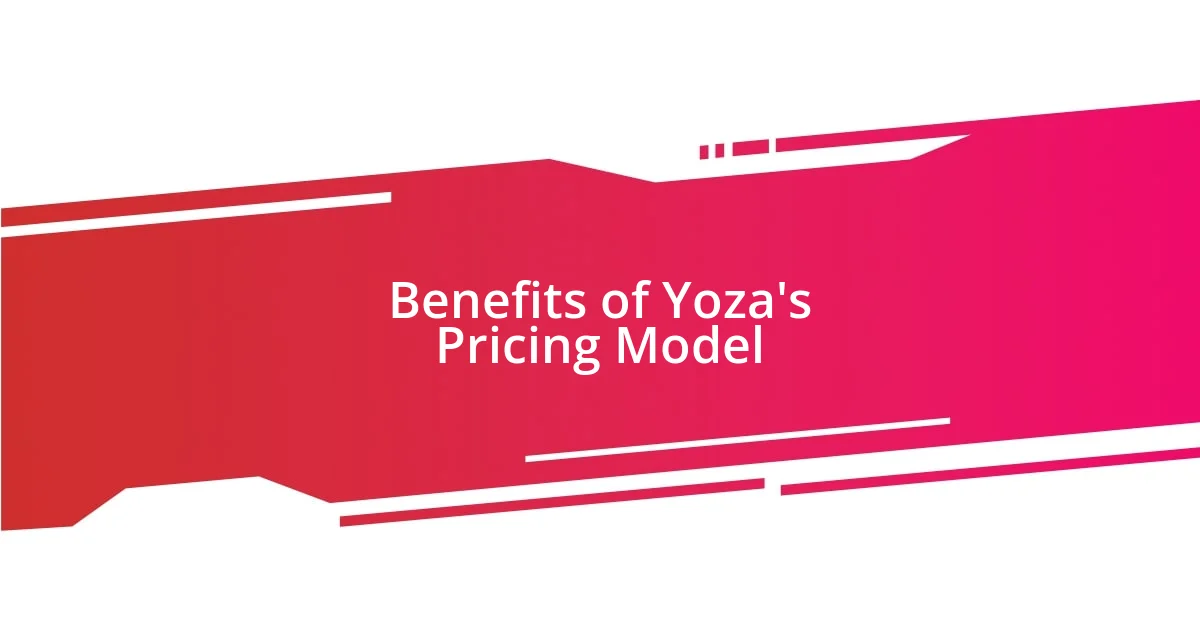
Benefits of Yoza’s Pricing Model
The flexibility of Yoza’s pricing model feels like a breath of fresh air. I remember when I had to make sacrifices to fit my budget into a rigid pricing structure. With Yoza, I can choose a plan that aligns not just with my wallet but also with the specific needs of my projects, ultimately leading to a more satisfying user experience.
Another standout benefit of Yoza’s pricing is the inclusion of advanced features in their mid-tier plan. I can’t help but think back to times when I committed to a higher-priced plan elsewhere, only to find I didn’t fully utilize all the features. With Yoza, I feel I’m not locked into a high-scale investment early on. It opens the door to learning and growth without the pressure, allowing me to explore at my own pace.
Then there’s the straightforward nature of Yoza’s pricing—it makes choosing a plan so much easier. I remember countless hours spent combing through fine print, feeling more confused with each line I read. Seeing clear pricing and no hidden fees with Yoza gives me peace of mind that I’m making a wise choice. Isn’t it refreshing to know exactly what I’m getting for my money?
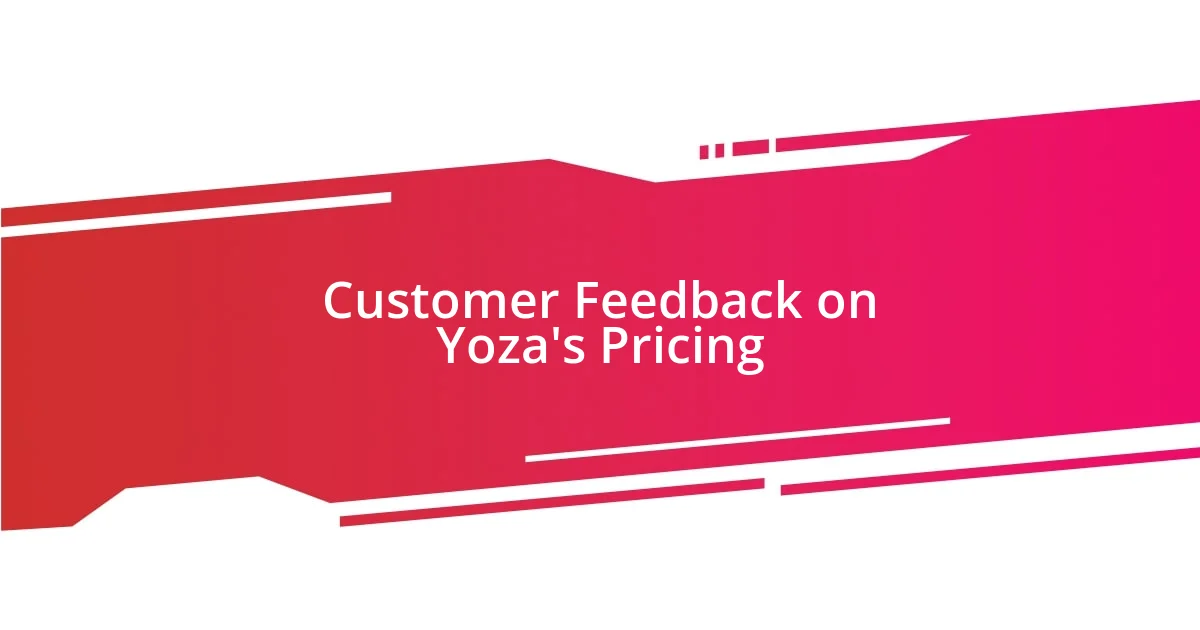
Customer Feedback on Yoza’s Pricing
When it comes to customer feedback on Yoza’s pricing, many users express a sense of relief and satisfaction. I remember reading through various forums where customers praised the transparent pricing structure that Yoza offers. It’s interesting to see how this clarity helps eliminate the anxiety that often surrounds monthly bills; no one enjoys surprises when it comes to spending, right?
Another recurring theme in the feedback is the appreciation for Yoza’s tiered plans. One user shared how they were pleasantly surprised to find valuable features included in a mid-range option, facilitating a seamless experience without feeling overwhelmed financially. I can relate to the feeling of wanting advanced features but being held back by exorbitant prices. This resonated with many, as they too valued a service that grows with their needs without breaking the bank.
Furthermore, I encountered comments from customers who highlighted Yoza’s responsiveness to feedback regarding its pricing. They spoke of updates that reflected customer suggestions, which created a sense of community and trust. Reflecting on my experiences, this kind of adaptability in pricing not only fosters loyalty but can transform casual users into brand advocates. Have you ever felt that a company truly listens to you? It’s a game changer.
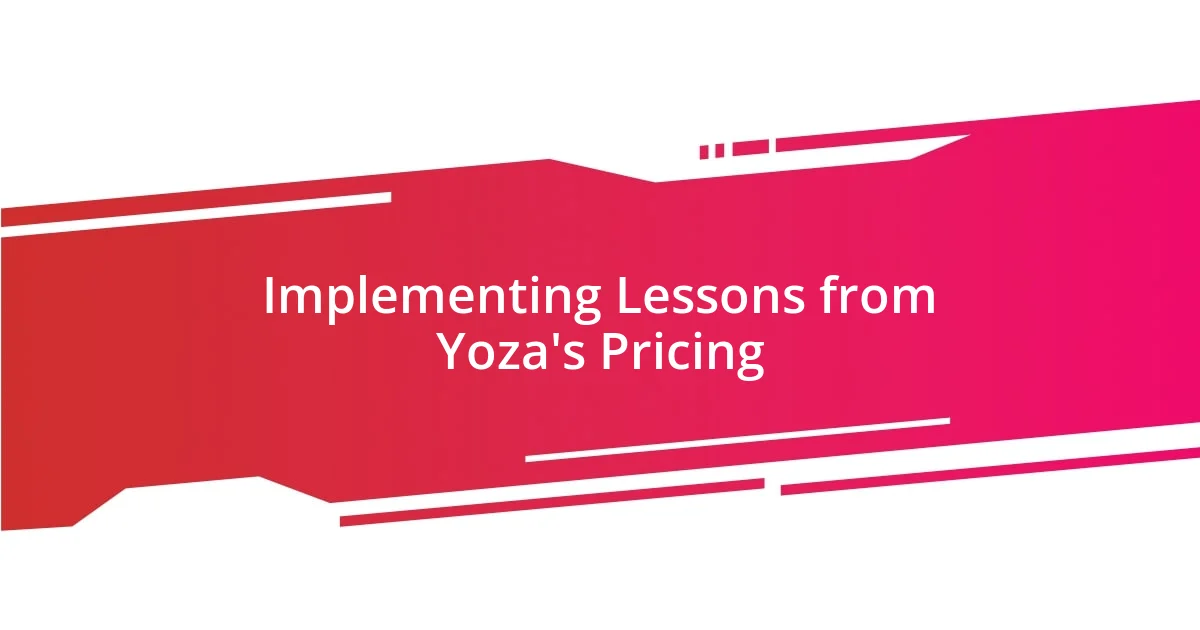
Implementing Lessons from Yoza’s Pricing
Implementing the lessons from Yoza’s pricing has made me rethink how I approach my budgeting for tools. I vividly recall the first time I opted for a flexible plan that allowed me to scale my usage without the stress of long-term commitments. It was liberating! Why should we feel trapped by pricing when we’re merely starting out? Having choices at every level freed me to invest where it truly mattered for my projects.
Another key insight I’ve gained is the importance of clear communication about features and costs. Once, I found myself tangled in a jumble of vague terms from another service, feeling lost and frustrated. But with Yoza, the straightforward pricing model not only clarified what I’d be paying but also instilled a sense of confidence in my decision-making. Who doesn’t want the excitement of knowing they’re not overpaying for unwanted features? This clarity allows me to focus on my projects rather than my budget.
Lastly, I’ve appreciated Yoza’s openness to feedback as a critical takeaway. Reflecting on times when companies overlooked customer opinions, I felt a distance grow that led to dissatisfaction. However, witnessing Yoza actively respond to user suggestions was refreshing! It made me feel like my thoughts had weight, reinforcing that I wasn’t just a number. Isn’t it impactful when companies actively shape their services through our voices? That connection is invaluable and makes me more likely to stick around.
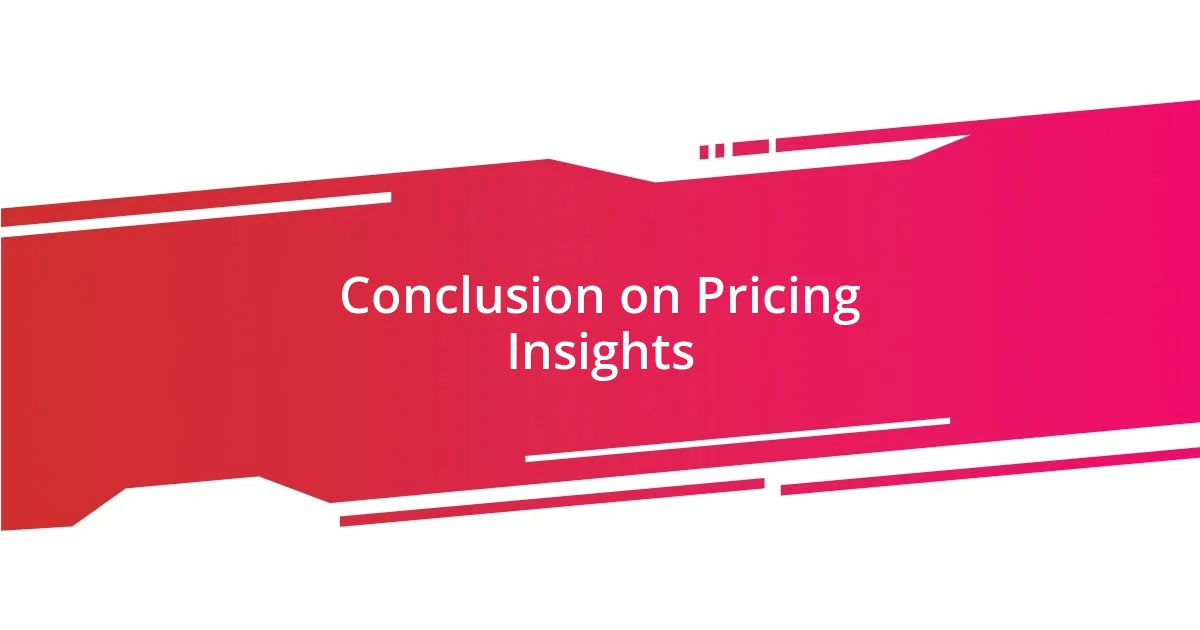
Conclusion on Pricing Insights
Reflecting on my insights into Yoza’s pricing has truly changed my perspective on how services can align with user needs. When I first interacted with their pricing model, I felt an immediate sense of liberation—like shedding a heavy weight. Have you ever tried a subscription and felt shackled by the costs? With Yoza, that burden lifted, revealing a more adaptable approach to spending that catered to my needs.
Moreover, the candidness in Yoza’s pricing made me appreciate the value of transparency. I recall switching from a service that constantly altered its pricing without notice, leaving me bewildered and frustrated. That experience left me yearning for clarity, which I found in Yoza’s model. Doesn’t it feel empowering to know exactly what you’re paying for without the hidden fees? It’s an experience that makes decision-making feel not just straightforward, but genuinely trustworthy.
In conclusion, what stands out most to me is the community aspect spawned by responsive pricing strategies. I distinctly remember engaging in conversations with fellow users about how pricing changes truly reflected our feedback. It was empowering to realize our voices mattered. Wouldn’t you agree that feeling heard transforms your entire relationship with a company? This connection breeds loyalty and ensures customers feel valued, making it a win-win for everyone involved.










